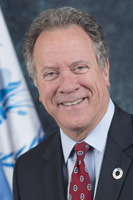
Podcast/Video Interviews by Stephen Ibaraki
World Food Programme (WFP) -- Winner Nobel Peace Prize 2020 October 9th -- DEEP CHAT WITH DAVID BEASLEY, EXECUTIVE DIRECTOR
WFP: Tops Globally--Largest UN Agency, Largest Humanitarian Program, First and top-ranked UN Innovation Accelerator, Fast Company Top Awards 2017/2020, Largest Humanitarian Logistics Supply Network
Nobel Peace Prize for 2020 awarded to World Food Programme (WFP): https://www.nobelprize.org/prizes/peace/2020/press-release/
This week, Stephen Ibaraki has an exclusive interview with David M. Beasley.
 In a public service and business career that spans more than four decades, David Beasley has worked across political, religious and ethnic lines to champion economic development, humanitarian assistance, education, and intercultural and interfaith cooperation for the most vulnerable people across the globe. For the past 10 years, Mr Beasley has worked with influential leaders and on-the-ground programme managers in more than 100 countries on projects to foster peace, reconciliation and economic progress. In Ethiopia, he worked alongside Tony Hall, former U.S. Ambassador to the United Nations food agencies¹ on a partnership with the Project Mercy charity to increase food access for internally displaced people.
In a public service and business career that spans more than four decades, David Beasley has worked across political, religious and ethnic lines to champion economic development, humanitarian assistance, education, and intercultural and interfaith cooperation for the most vulnerable people across the globe. For the past 10 years, Mr Beasley has worked with influential leaders and on-the-ground programme managers in more than 100 countries on projects to foster peace, reconciliation and economic progress. In Ethiopia, he worked alongside Tony Hall, former U.S. Ambassador to the United Nations food agencies¹ on a partnership with the Project Mercy charity to increase food access for internally displaced people.
Mr Beasley has also helped strengthen cooperation and communication among the business, political and non-governmental sectors in regions of long-standing political, ethnic and religious tension. In 2016, he and his team led an international conference in Kosovo that brought hundreds of business and political leaders from the Balkans together for five days of dialogue.
As Governor of the U.S. state of South Carolina from 1995 to 1999, Mr Beasley provided a steady hand in moments of crisis. His leadership before, during and after hurricanes enabled the evacuation of hundreds of thousands of people and ensured access to food, healthcare and shelter for the most vulnerable households during and immediately after the natural disasters. He cast a vision of reform, overhauling the state's criminal justice system, the economy, the welfare system and the educational system. Setting measurable goals and focusing on specific growth industries, he transformed the economy into a healthy, diverse, and robust market, achieving one of the lowest unemployment rates in the country and increasing annual private sector capital investment. He established a Race Relations Commission and brought an unprecedented number of women and members of minority groups into his cabinet and senior positions. Mr Beasley was the first Governor in South Carolina to call for the removal of the Confederate Flag from the State Capitol, a stand that played a significant role in his unsuccessful re-election bid, but earned him the John F. Kennedy Profile in Courage Award.
As a political figure, Mr Beasley honed his diplomatic skills and has continued to put them to use after leaving public office. He believes strongly that personal dialogue and relationships are critical to conflict resolution. He has traveled to as many as 30 countries each year promoting peace and leading conferences and missions in Kosovo, South Sudan, Sudan, Tunisia and Yemen, among other countries. Through his travels, Mr Beasley has developed close personal relationships with leaders in many nations, including heads of state and members of national parliaments.
Mr Beasley received his Bachelor's degree from Clemson University and a Doctor of Jurisprudence degree from the University of South Carolina and taught at the Harvard University Kennedy School of Government. He was first elected to public office at the age of 21 as a member of the South Carolina House of Representatives. He is married to the former Mary Wood Payne and is the father of four children.
¹The Food and Agriculture Organization of the United Nations, the International Fund for Agricultural Development and the World Food Programme.
TO WATCH THE VIDEO INTERVIEW, CLICK ON THIS MP4 file link